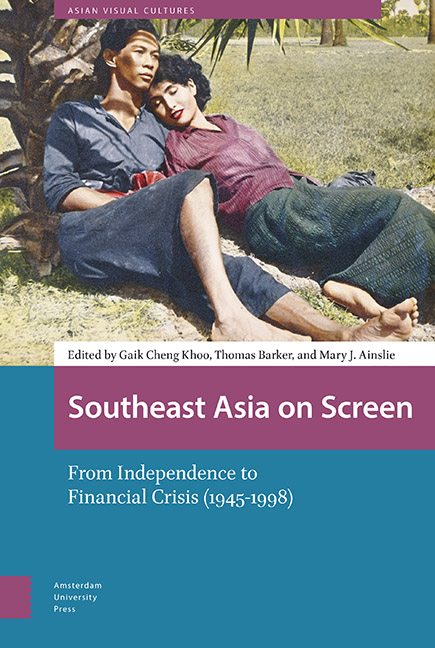Book contents
- Frontmatter
- Contents
- List of Illustrations
- Introduction: Southeast Asia on Screen: From Independence to Financial Crisis (1945–1998)
- Section 1 Independence and Post-World War II Filmmaking: Nation-building, Modernity and Golden Eras
- Section 2 Key Directors
- Section 3 Popular Pleasures
- About the Authors
- Index
11 - Transnational Exploitation Cinema in Southeast Asia: The Cases of Indonesia and the Philippines
Published online by Cambridge University Press: 20 November 2020
- Frontmatter
- Contents
- List of Illustrations
- Introduction: Southeast Asia on Screen: From Independence to Financial Crisis (1945–1998)
- Section 1 Independence and Post-World War II Filmmaking: Nation-building, Modernity and Golden Eras
- Section 2 Key Directors
- Section 3 Popular Pleasures
- About the Authors
- Index
Summary
Abstract
Under authoritarian rule, Indonesia and the Philippines developed production systems to facilitate the export of films to the global exploitation and B-grade markets. Framed by the colonial relationship with the United States, independent Filipino producers in the 1950s began working with mostly American partners on diverse low-cost titles. By the 1970s, the Philippines had become the choice location for many foreign co-productions. In Indonesia in the early 1980s, a group of local producers similarly pursued exploitation production for global export as a means to generate income. Production in both countries is framed by the Manila International Film Festivals (1982-1983), which marked Imelda Marcos's attempt to formalize the co-production industry and make Southeast Asia a new hub for co-production and export.
Keywords: exploitation cinema, co-productions, Indonesian cinema, Philippine cinema, export
Introduction
Authoritarian regimes are often characterized by their repression of creative and artistic work and the forms of resistance and critique that such repression engenders in the work of artists and filmmakers. The repressive regimes of Marcos in the Philippines (1965-1986) and Suharto in Indonesia (1966-1998) are no exception to this model, and many studies of film in this period have been framed in this way (Sen 1995; Yeatter 2007, p. 129). In this chapter we describe an alternative paradigm of cinematic production under authoritarianism, namely exploitation cinema intended for the global market. By tracing the respective histories of exploitation production and export in both countries, this chapter shows how they came to supply these markets despite differing histories and modes of production.
We trace the Philippines film connection to the United States, which extends back before World War II and which established the conditions and contacts for an American-Filipino co-production industry to form. In the Philippines, three local director-producers (Cirio Santiago, Gerry de León and Eddie Romero) became important figures mediating between the Philippines as a production location and American producers and distributors. This provided the conditions for the Marcos regime to host the Manila International Film Festival (MIFF) in 1982 and 1983. Indonesian film producers who attended MIFF and saw the potential of the export market subsequently orientated their production and ambitions to supplying the exploitation market.
- Type
- Chapter
- Information
- Southeast Asia on ScreenFrom Independence to Financial Crisis (1945–1998), pp. 233 - 254Publisher: Amsterdam University PressPrint publication year: 2020



